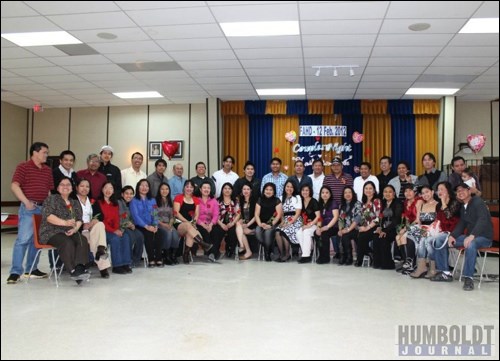When it comes to celebrating their culture in Canada, the Filipinos like to do it together. That's one reason why the immigrant population that began to arrive in Humboldt area three years ago has formed an informal association in the city.
"The association really started in 2009, and it just grows and grows every year as more people arrive," said Virginia Po, one of its founding members. "Now, it's like 48 Filipino families are here, and 65 or 75 per cent of them own a house here."
Three ladies from the Filipino community who form part of the backbone of the association that organizes special events at Christmas or other occasions caught the attention of pastoral associate Marie-Louise Ternier-Gommers of St. Augustine Parish.
"They are a wonderful group of new citizens in our midst," Ternier-Gommers told the Journal. She says a fair number of Filipinos have become members of the parish and as a result, she has gotten to know them and been invited to some of their events.
Even though they like to organize events such as a special Valentine's Day evening recently, the people from southeast Asia say they are happy to be living in Canada.
"We are enjoying it here," said Arceli Mallari, one of the three women who help run the association. "It's a simple lifestyle here and it suits us, so we prefer to stay here for now."
With a community that continues to grow, the three women talked about plans to make the association a registered entity.
"We are wanting to make this group official," Po said, "and I am asking the Humboldt Regional Newcomers Centre (HRNC) to help us with what should be done to make this official if we have to register the group."
That way, Po says, the association will be able to access grant money from the government to contribute toward their events, or perhaps for a permanent locale.
"One of our objectives, too, is to help newcomers," said Marian Legaspi, the third core organizer of the group. Legaspi says the idea would be that when a new family arrives in town, the association would be there to assist them, either financially, if such a fund exists, or with furniture or other household goods.
"There are some families who came here in the past year," Mallari added. "They find it very hard (when they arrive), so it will help if there is somebody that can assist them. And it's easier to communicate when there are people from your own culture."
Although they like to socialize within their own culture, the Filipinos are also open to the idea of extending the invitation for non-Filipinos to attend some of their events.
"The HRNC really helped us to mingle with other cultures through their activities," Po said, "such as the multi-cultural dinner the HRNC staff put on before Christmas."
"And there are some Filipinos married to Canadians or people of other nationalities," added Mallari. "So we would like to include them and their families."
The ladies spoke about future plans for a summer event that they are thinking of organizing.
"We are planning to make this kind of like a Sportfest," Po said. "We would invite everyone who wants to join us. Then maybe we can play our traditional games, because we have our own traditional games."
She says their events seem different to Canadians because they originate from a different culture, and they are finding people in the area ask them if they can come to their events.
"Right now we are just trying things," she explained. "It's like trial and error, the Valentine's Day party. But we will think about including people outside the Filipino community in the future."

.png;w=120;h=80;mode=crop)

.png;w=120;h=80;mode=crop)
